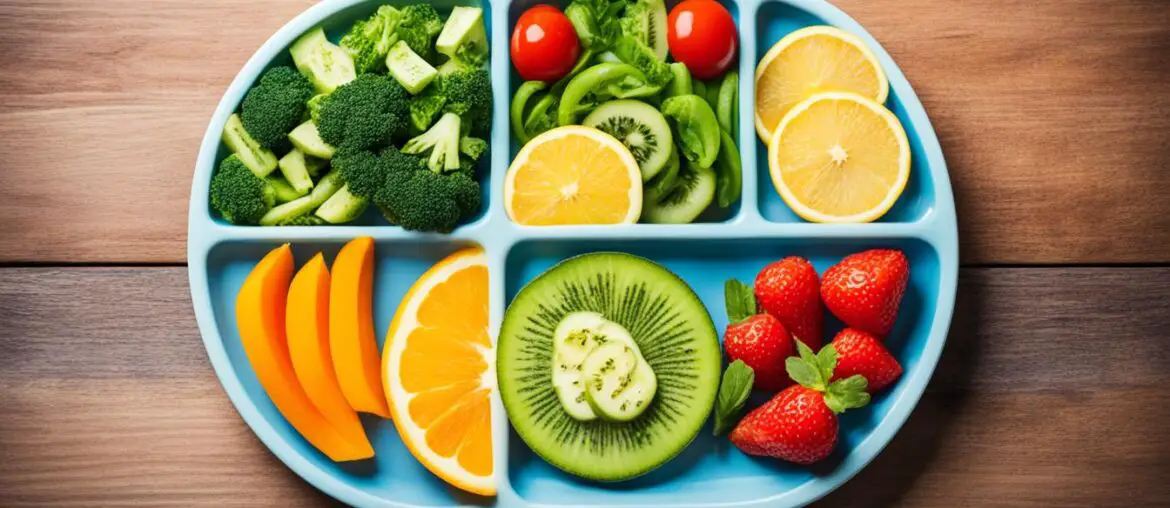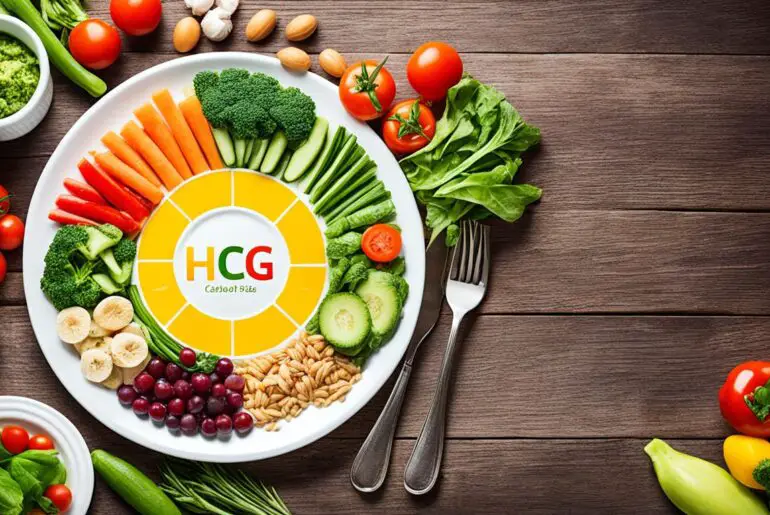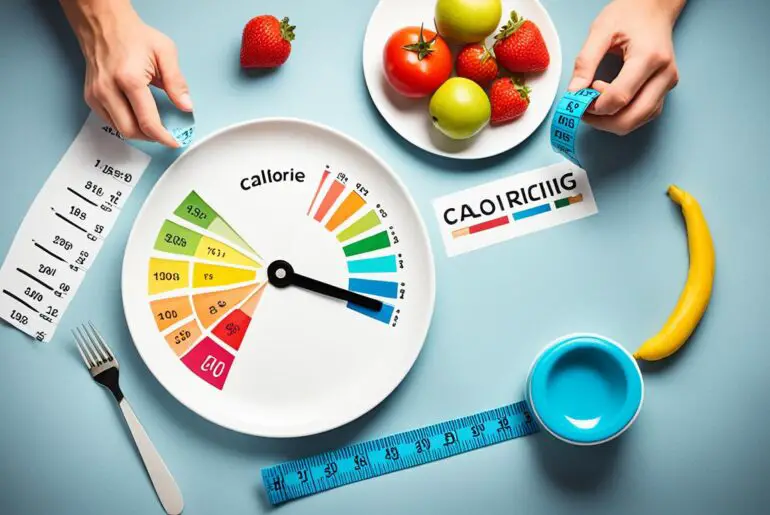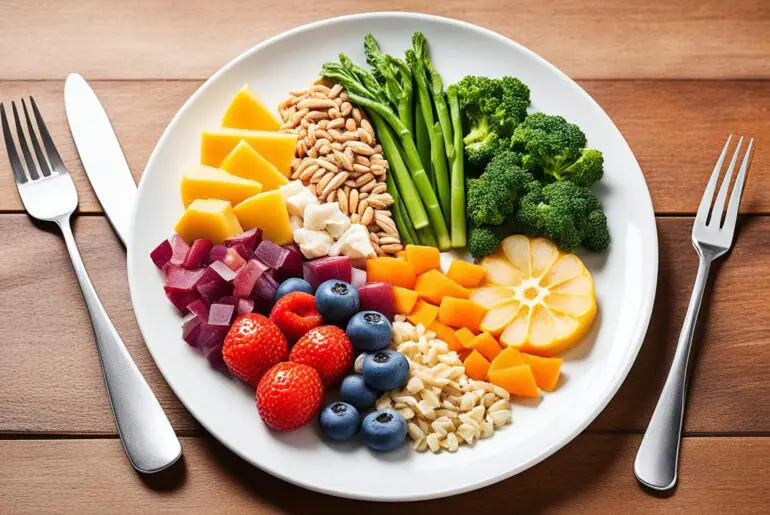Are you tired of trying numerous diets with little success? Have you heard about the HCG Diet and its promising results? But before you jump on the bandwagon, let’s explore the calorie guidelines and protocol of the HCG Diet.
The HCG Diet, developed by Dr. A.T.W. Simeons, is a weight loss protocol that focuses on calorie restriction. But is consuming only 500 or 800 calories per day really the key to shedding those extra pounds? Is the HCG Diet suitable for beginners? Let’s find out.
Key Takeaways:
- The HCG Diet is a weight loss protocol that involves calorie restriction.
- Dr. A.T.W. Simeons developed the HCG Diet.
- The HCG Diet consists of multiple phases, including a loading phase and a low-calorie phase.
- Consulting with a healthcare professional before starting the HCG Diet is essential.
- Stay tuned to discover the calorie guidelines and other important aspects of the HCG Diet!
Phase 1 – Loading
The HCG Diet consists of multiple phases, each serving a specific purpose in the weight loss protocol. Phase 1, also known as the loading phase, is a crucial step to prepare the body for the calorie-restricted phase that follows. During this two-day period, individuals are advised to consume high-fat, high-calorie foods.
The primary goal of the loading phase is to build up fat stores in the body. By consuming foods rich in fats and calories, individuals can ensure their bodies have enough energy reserves to sustain them during the subsequent low-calorie phase. This phase also helps prevent extreme hunger and cravings that often accompany sudden calorie restriction.
During the loading phase, individuals can indulge in foods they may have restricted in their daily diets, such as burgers, fries, ice cream, and pastries. While it may seem counterintuitive to eat these indulgent foods, they play a crucial role in jump-starting the weight loss journey.
During the loading phase of the HCG Diet, it’s important not to hold back. Enjoy those high-calorie treats guilt-free, as they will help set the stage for successful weight loss.
By consuming a surplus of calories during this phase, the body enters a state where it is more prepared to burn stored fat during the subsequent calorie-restricted phase. It’s important to note that the loading phase lasts only two days, ensuring individuals don’t prolong their intake of high-calorie foods.
Here’s a breakdown of the loading phase:
- Duration: Two days
- Food Choices: High-fat, high-calorie foods
- Recommended Caloric Intake: As high as 3000-4000 calories per day
Remember, the loading phase is a crucial step in the HCG Diet protocol. Embrace it as an opportunity to indulge in your favorite foods and prepare your body for the calorie-restricted phase that lies ahead.
Phase 2 – Weight Loss
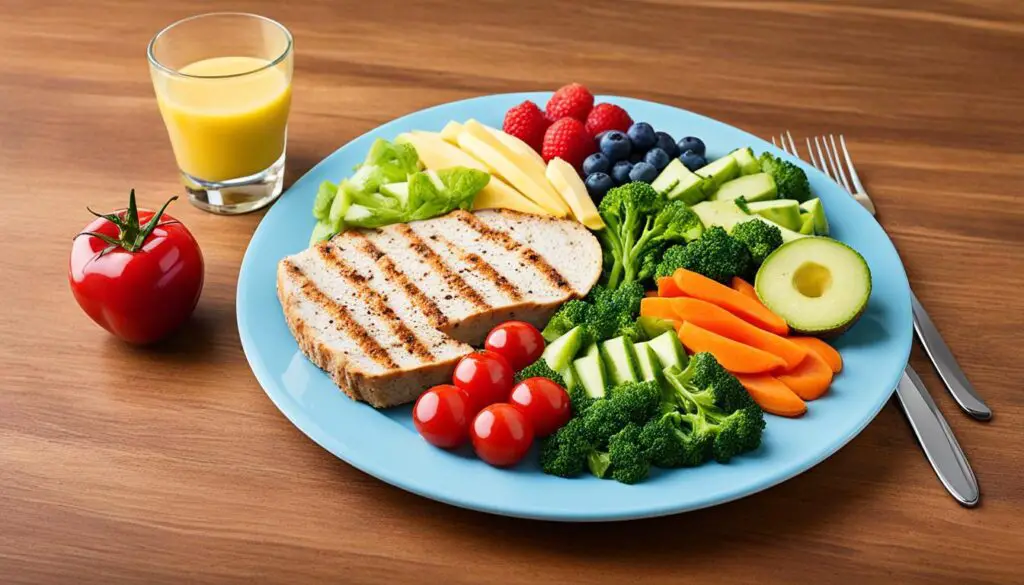
Phase 2 of the HCG Diet is the weight loss phase, lasting for three to six weeks. During this phase, individuals follow a very low-calorie diet, with calorie intake limited to 500 or 800 calories per day depending on the specific plan. The goal of this phase is to promote rapid weight loss while maintaining muscle mass.
The HCG Diet meal plan during Phase 2 mainly consists of lean proteins, certain vegetables, and a limited amount of fruits. Lean proteins such as chicken breast, fish, and lean beef provide essential amino acids for muscle maintenance. Vegetables like spinach, broccoli, and tomatoes offer vital nutrients and fiber. Fruits, such as apples, oranges, and strawberries, provide a natural source of sugar while still being low in calories. By focusing on these food groups, individuals can minimize hunger and achieve weight loss.
The HCG hormone supplements or injections are continued during Phase 2. These supplements help stimulate the breakdown of stored fat, aiding in the fat burning process. The HCG hormone also helps prevent muscle loss, ensuring that the weight loss primarily comes from fat stores.
During Phase 2, it is important to closely follow the HCG Diet calorie intake recommendations. The drastic calorie restriction is a key aspect of the diet, as it forces the body to utilize stored fat for energy. This, in turn, leads to significant weight loss results. However, it is crucial to consult with a healthcare professional before beginning any calorie-restricted diet to ensure it is suitable for your individual needs.
During Phase 2 of the HCG Diet, it is important to monitor your progress and make adjustments as needed. Regular check-ins with a healthcare professional can provide guidance and support throughout this phase. Following the HCG Diet protocol and maintaining the recommended calorie intake will help maximize weight loss and achieve your desired goals.
Key points for Phase 2:
- Follow a very low-calorie diet of 500 or 800 calories per day
- Consume lean proteins, vegetables, and a limited amount of fruits
- Continue taking HCG hormone supplements or injections
- Monitor progress and consult with a healthcare professional
HCG Diet Food List
During the low-calorie phase of the HCG Diet, there are specific foods that are allowed and others that are restricted. It’s important to adhere to these guidelines to maximize the effectiveness of the diet and achieve your weight loss goals. Here is a breakdown of the HCG Diet’s food list:
Allowed Foods
1. Lean Proteins:
- Chicken breast
- Fish
- Lean beef
2. Vegetables:
- Spinach
- Broccoli
- Tomatoes
3. Fruits:
- Apples
- Oranges
- Strawberries
It’s important to note that fruits should be consumed in moderation due to their natural sugar content. Aim for one serving per meal or snack.
Restricted Foods
1. Oils:
Oils, whether for cooking or dressing, are not allowed on the HCG Diet as they add unnecessary calories. It’s best to avoid all types of oils, including olive oil and coconut oil.
2. Dairy Products:
Dairy products such as milk, cheese, and yogurt are not permitted during the low-calorie phase. These foods can be high in calories and carbohydrates, making them incompatible with the HCG Diet.
3. High-Carb Foods:
Carbohydrate-rich foods like bread, rice, pasta, and grains are not allowed on the HCG Diet. These foods can spike blood sugar levels and hinder the weight loss process.
4. Sweets:
Sugary treats, desserts, and sweetened beverages should be avoided entirely during the low-calorie phase. These foods are high in calories and can lead to cravings and a potential derailment of the diet.
By sticking to the allowed foods on the HCG Diet and avoiding the restricted ones, you can optimize your calorie intake and promote effective weight loss. Remember to consult with a healthcare professional before starting any diet or weight loss regimen.
HCG Diet Tips
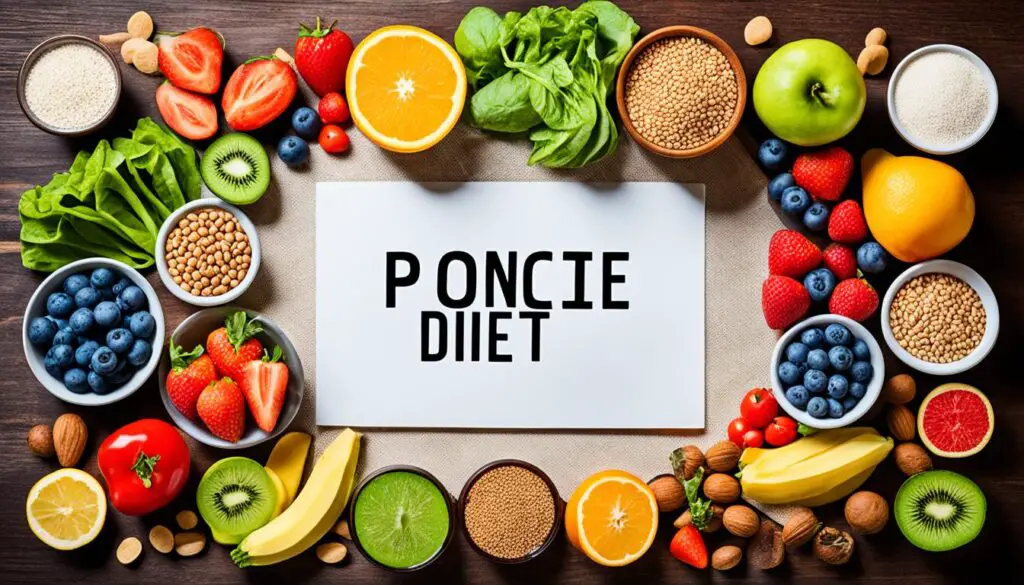
When following the HCG Diet, there are several tips and guidelines that can help you maximize your results and maintain adherence to the protocol.
1. Stay Hydrated
It is essential to stay hydrated by drinking plenty of water throughout the day. Adequate hydration can help reduce cravings and promote overall well-being during the diet.
2. Spread Out Meals
Instead of consuming all your calories in one or two meals, spreading them out throughout the day can help minimize hunger and maintain stable energy levels. Aim for three to six small meals/snacks to keep your metabolism active.
3. Plan Ahead
Planning your meals in advance can be a helpful strategy to stay on track with the calorie restrictions of the HCG Diet. By having pre-prepared meals and snacks available, you can avoid impulse eating and make healthier choices.
4. Seek Support
Finding support from a healthcare professional, such as a registered dietitian or a doctor experienced in the HCG Diet, can provide valuable guidance and personalized recommendations. Additionally, joining a support group or online community of individuals following the HCG Diet can offer motivation, tips, and a sense of community.
By implementing these HCG Diet tips, you can enhance your overall experience and improve your chances of success on the protocol. Remember to always consult with a healthcare professional before starting any new diet or weight loss plan.
HCG Diet Exercise
While the HCG Diet primarily focuses on calorie restriction and HCG hormone supplementation, incorporating exercise can have additional benefits for overall health and well-being. Although the diet does not emphasize a specific exercise regimen, moderate physical activity can be included if desired and based on individual exercise levels and preferences.
Some suitable exercises that can be incorporated into the HCG Diet plan include brisk walking, yoga, light cardio exercises, and strength training using light weights. These activities help maintain muscle tone and flexibility while promoting cardiovascular health.
It is essential to listen to your body and adjust the intensity of exercise accordingly while on the HCG Diet. Astute attention should be given to any signs of exhaustion, dizziness, or discomfort during physical activity. It is advisable to consult with a healthcare professional before starting or modifying any exercise routine.
Incorporating exercise during the HCG Diet can help boost mood, enhance energy levels, and promote muscle maintenance. However, it is important to note that vigorous or high-intensity exercises are not recommended during the low-calorie phase, as they may strain the body and potentially lead to exhaustion or nutritional deficiencies.
Plateau Breakers

During the HCG Diet, it is not uncommon to experience plateaus, where weight loss slows down or comes to a halt for a period of time. Plateaus can be frustrating, but there are strategies you can implement to break through and continue making progress towards your weight loss goals.
1. Increase Water Intake
One effective way to break through a plateau is by increasing your water intake. Drinking an adequate amount of water can help boost your metabolism, flush out toxins, and promote weight loss. Aim to drink at least 8-10 glasses of water per day to stay hydrated and support your weight loss efforts.
2. Increase Protein Intake
Another strategy to overcome a weight loss plateau is to increase your protein intake. Protein is essential for muscle maintenance and repair, and it can also help increase satiety, reduce cravings, and boost your metabolism. Incorporate lean sources of protein such as chicken, fish, tofu, and Greek yogurt into your meals to support your weight loss journey.
3. Avoid Certain Condiments
Some condiments, such as ketchup, may contain hidden sugars and calories that can hinder weight loss progress. Check the labels of condiments carefully and opt for sugar-free or lower-calorie alternatives. By doing so, you can avoid unnecessary calories that may contribute to a plateau.
4. Eliminate Specific Foods
In some cases, certain foods may be causing a stall in weight loss. One common culprit is breadsticks, which are often included in the HCG Diet meal plan. Instead of breadsticks, consider eliminating them and focusing on other allowed foods that align with your weight loss goals. Monitor your progress and make adjustments to your diet accordingly.
5. Check for Medication Changes and Health Conditions
If you’re experiencing a prolonged plateau despite following the HCG Diet protocol diligently, it may be worth checking for any recent changes in your medication or underlying health conditions that could be impacting your weight loss. Consult with your healthcare provider to rule out any other factors that may be affecting your progress.
By implementing these strategies and staying consistent with the HCG Diet, you can overcome plateaus and continue on your weight loss journey. Remember to consult with a healthcare professional before making any significant changes to your diet or exercise routine.
HCG Diet Maintenance Phase

After completing the low-calorie phase, individuals enter the maintenance phase of the HCG Diet. This phase, also known as HCG Diet Phase 3, typically lasts for three weeks. During this phase, the calorie intake is increased to a range of 1500-2000 calories per day. The primary focus shifts from rapid weight loss to maintaining the achieved weight loss and finding a customized metabolic balance.
During the HCG Diet maintenance phase, it is crucial to gradually increase calorie intake and choose healthy foods that support long-term weight management. This gradual increase helps to stabilize the body’s metabolism and prevent excessive weight gain. It is recommended to continue consuming lean proteins, vegetables, fruits, and healthy fats, while avoiding processed foods, sugary drinks, and high-calorie snacks.
This phase plays a vital role in transitioning the body from a weight loss mode to a weight maintenance mode. It allows individuals to enjoy a wider variety of foods while still being mindful of their calorie intake. However, it is important to note that maintaining a healthy lifestyle and weight requires ongoing dedication and adherence to a balanced diet and regular physical activity.
Benefits of HCG Diet Maintenance Phase
- Helps stabilize metabolic rate
- Promotes long-term weight management
- Allows for a wider variety of food choices
- Encourages the development of healthier eating habits
- Supports the transition to a sustainable healthy lifestyle
HCG Diet Maintenance Phase Tips
- Gradually increase calorie intake to avoid sudden weight gain
- Focus on nutrient-dense foods to support overall health
- Continue monitoring portion sizes to maintain calorie balance
- Incorporate regular exercise or physical activity to support weight management
- Stay mindful of overall energy balance and eat according to hunger cues
Sample Meal Plan for HCG Diet Maintenance Phase
| Meal | Food Choices |
|---|---|
| Breakfast | Omelette with vegetables and avocado |
| Lunch | Grilled chicken salad with mixed greens, tomatoes, and vinaigrette dressing |
| Afternoon Snack | Greek yogurt with berries |
| Dinner | Salmon with steamed broccoli and quinoa |
| Evening Snack | Handful of almonds |
Remember, the HCG Diet maintenance phase is an essential part of your weight loss journey. It provides an opportunity to solidify your healthy habits and sustain your hard-earned weight loss. Stay committed, make mindful choices, and consult with healthcare professionals or registered dietitians to ensure optimal results.
HCG Diet Risks and Considerations
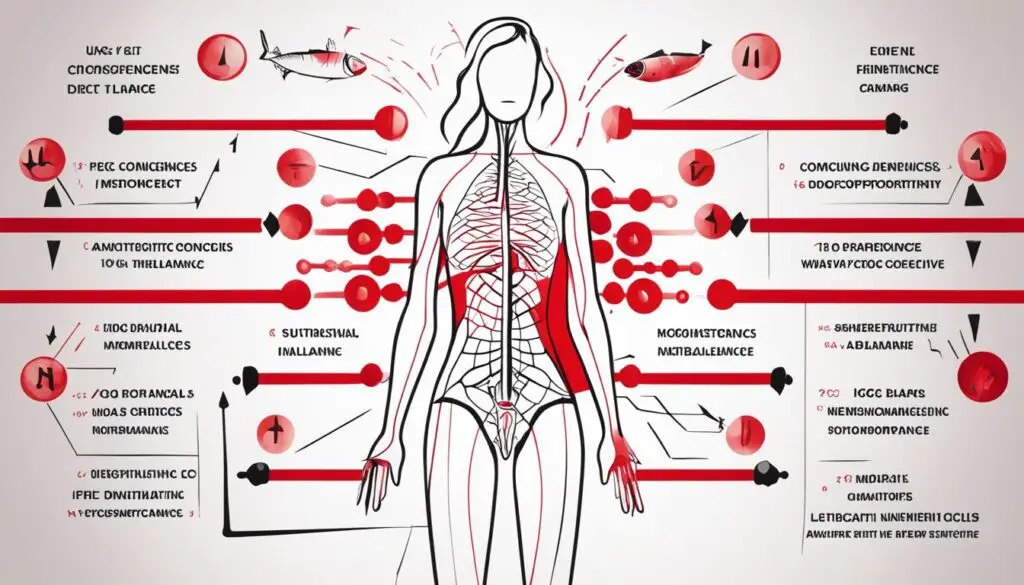
The HCG Diet has garnered significant controversy and raises important considerations regarding its safety and potential risks. As a weight loss protocol, it is essential to be aware of the following aspects before embarking on this diet.
The FDA’s stance:
The Food and Drug Administration (FDA) has not approved HCG supplements or injections for weight loss purposes. Furthermore, over-the-counter HCG products are deemed illegal. It is crucial to understand that the HCG Diet lacks official recognition as a safe and effective weight loss method from regulatory authorities.
Potential nutrient deficiencies:
One of the primary concerns with the HCG Diet is the extreme calorie restriction it imposes. Consuming only 500 or 800 calories per day can lead to nutrient deficiencies. This restricted intake may not provide adequate amounts of essential vitamins, minerals, and other nutrients that your body needs to function optimally.
Potential side effects:
Individuals following the HCG Diet may experience side effects such as headaches and fatigue due to the drastic reduction in calorie intake. These symptoms can be attributed to the body’s adjustment to significantly reduced energy levels. Monitoring your health and well-being closely while on the diet is crucial.
Considering the potential risks and drawbacks associated with the HCG Diet, it is of paramount importance to consult with a healthcare professional before initiating this weight loss protocol. They can provide individualized guidance, address any concerns, and offer alternative approaches that align with your specific health needs and goals.
Conclusion
After examining the details and controversy surrounding the HCG Diet, it is clear that this weight loss protocol comes with significant risks and potential side effects. While some individuals may see quick results, it is important to consider the long-term implications and consult with a healthcare professional before embarking on any diet or weight loss plan.
The HCG Diet relies on severe calorie restriction and HCG hormone supplementation, neither of which are recognized as safe or effective by health experts. The potential for nutrient deficiencies, headaches, and fatigue outweigh the short-term benefits of rapid weight loss.
For those seeking sustainable and safe weight loss options, it is advisable to explore other approaches that prioritize balanced nutrition and regular exercise. Consulting with healthcare professionals or registered dietitians can provide valuable guidance and personalized recommendations to achieve long-term success in achieving and maintaining a healthy weight.
FAQ
What are the calorie guidelines for the HCG Diet?
The HCG Diet involves a very low-calorie phase where individuals consume either 500 or 800 calories per day.
Who is the HCG Diet suitable for?
The HCG Diet is typically recommended for individuals who are overweight or obese and are looking for a structured weight loss plan.
What happens during Phase 1 of the HCG Diet?
Phase 1, also known as the loading phase, involves consuming high-fat, high-calorie foods for two days to prepare the body for the low-calorie phase.
What is Phase 2 of the HCG Diet?
Phase 2, the weight loss phase, lasts for three to six weeks and involves following a very low-calorie diet while taking HCG hormone supplements.
What foods are allowed on the HCG Diet?
Lean proteins, certain vegetables, and limited fruits are allowed on the HCG Diet. Oils, dairy products, and high-carb foods are not permitted.
Are there any exercise recommendations for the HCG Diet?
While exercise is not a focus of the HCG Diet, individuals can include moderate activities like walking or yoga if desired.
How can I break through plateaus on the HCG Diet?
To break through plateaus, individuals can try increasing water intake, protein intake, and avoiding certain condiments and specific foods.
What happens during the maintenance phase of the HCG Diet?
The maintenance phase involves increasing calorie intake and focusing on weight maintenance after completing the low-calorie phase.
What are the risks and considerations of the HCG Diet?
The HCG Diet is controversial and has not been approved by the FDA for weight loss. It can lead to nutrient deficiencies and potential side effects.
Should I consult with a healthcare professional before starting the HCG Diet?
Yes, it is strongly advised to consult with a healthcare professional before starting any weight loss or diet plan, including the HCG Diet.

